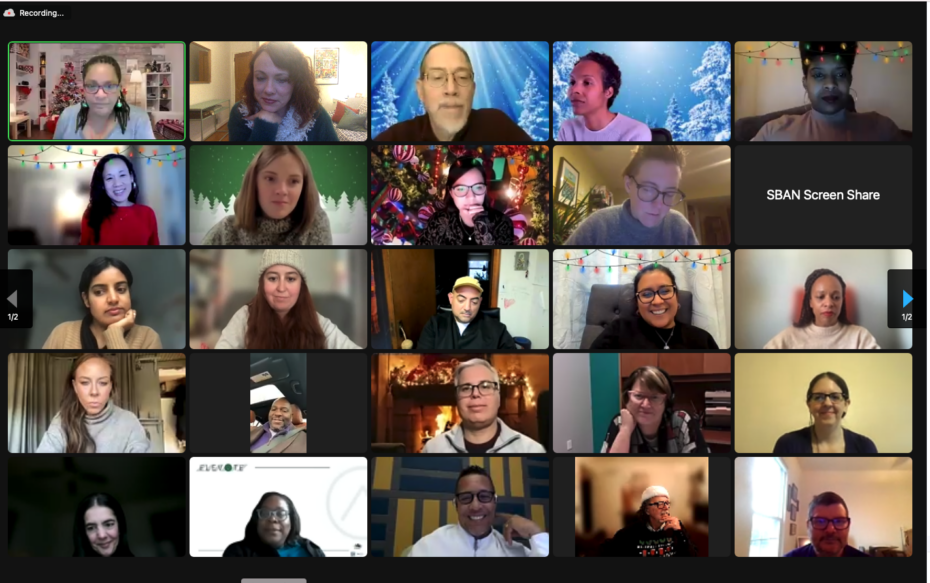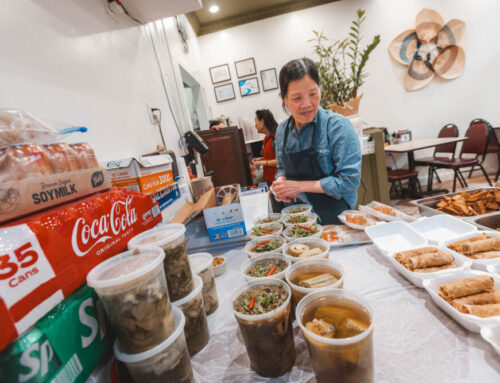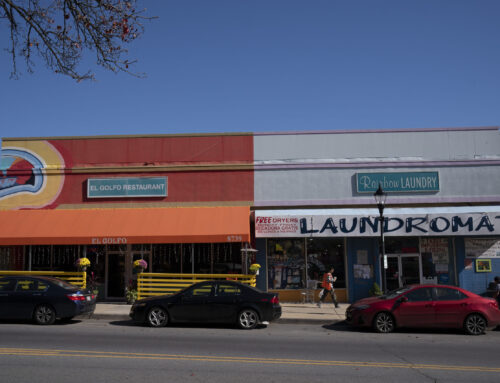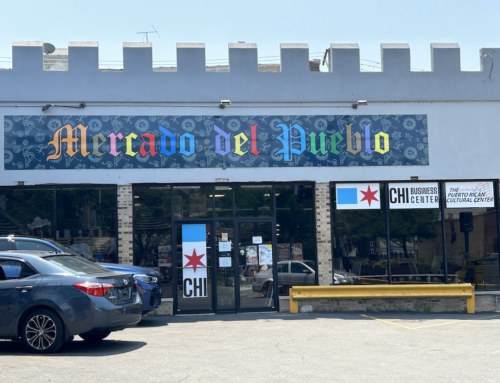SBAN Member News Roundup, December 2022

In this SBAN Member News Roundup, read about member awards, policy & advocacy efforts, new publications and resources, and work in the areas of wealth-building, access to capital, equitable development, preservation and placemaking, cooperatives, and entrepreneurial support.
Awards
As a part of a project in partnership with the Commonwealth of Massachusetts, Streetsense won the International Downtown Association’s Pinnacle Award for their Rapid Recovery Planning Program, led by Larisa Ortiz, Managing Director of Public Non-Profit Solutions and SBAN advisory board member.
The program distributed nearly $10 million across 124 communities throughout the Commonwealth to assess the impacts of COVID-19 and develop actionable, project-based recovery plans tailored to the unique economic challenges in downtowns, town centers, and commercial districts. Larisa co-wrote an article about this and similar place-based revitalization efforts in New York and Puerto Rico for the International Journal of Economic Development.
Anti-Displacement Policy & Advocacy
Inclusive Action for the City celebrated the signing of a new California law that legalizes street vending. In partnership with the East LA Community Corporation and numerous other organizations, Inclusive Action has been supporting the LA Street Vendor Campaign for more than a decade, beginning with efforts to decriminalize street vending at the city level. Among other news coverage, Next City published an in-depth piece on the long road and grassroots activism that led to SB 972.
New Publications, Presentations & Other Resources
The Purple Line Corridor Coalition (PLCC) and the National Center for Smart Growth at the University of Maryland released the report Purple Line Equitable Transit-Oriented Development Strategy, which aims to drive equitable development along the light rail line under construction in the Maryland suburbs of Washington, D.C. It includes strategies for affordable housing, small business preservation, safe pedestrian/bicycle access to stations, and inclusive economic growth. A Washington Post article noted that property values and rents are already rising along the Purple Line corridor, which includes low-income and immigrant neighborhoods.
PLCC also just landed a $1.5 million grant from the Federal Transit Administration to develop a plan for equitable development along the rail line, including small business preservation.
The Urban Institute released the report Leveraging Technology to Scale Up Small-Business Lending: A Guide for Community Development Financial Institutions and Their Funders with these key takeaways. Co-authored by Brett Theodos, the report draws on interviews with technology providers, philanthropic representatives, and CDFIs, among other stakeholders, to explore how CDFIs can increase their capacity to serve small businesses.
The Initiative for a Competitive Inner City (ICIC) and the Local Initiatives Support Corporation (LISC) have partnered to launch Bridging the Capital Access Gap, a free, publicly accessible curriculum and video series to help small business support organizations navigate the capital landscape with and for their clients. The five-part series takes an in-depth look at the small business financing industry and how business owners can use this knowledge to access additional avenues of capital.
Melissa Bradley, founder and managing partner at 1863 Ventures, spoke about the challenges and opportunities facing Black and Brown business owners at an Axios event examining the path forward for closing economic equity gaps and expanding economic opportunity in the United States.
Wealth-Building Efforts
Regina Hairston, president and CEO of the African-American Chamber of Commerce of Pennsylvania, New Jersey, and Delaware published an opinion piece about the Chamber’s national convening of Black mayors in Philadelphia, “how entrepreneurship is a viable way to help close the 228-year Black-white wealth gap,” and why building back Black post-pandemic means “we must take a comprehensive look at the real barriers businesses face and then muster the courage to implement program and policy interventions that will level the playing field.”
The Atlanta Wealth Building Initiative won the top grant at the Truist Foundation’s Inspire Awards, which invites nonprofit organizations that support BIPOC and women-owned businesses from across the country to submit innovative solutions designed to address challenges and roadblocks faced by small businesses. The initiative’s “1,000 Black Businesses in 1,000 Days Campaign” will address the racial wealth divide in Atlanta by strengthening Black-owned businesses.
Increasing Access to Capital
The National Association for Latino Community Asset Builders (NALCAB) was one of 12 organizations selected to collectively receive $50 million from Citi Foundation to advance the community finance field and support low-income communities and communities of color. NALCAB is using the grant to launch a technical assistance program to assist Latino-led nonprofit loan funds in securing CDFI certification.
NALCAB also received a grant from the U.S. Department of Commerce Minority Business Development Agency (MBDA) to increase capacity for non-profit lenders through its flexible loan guarantee product, the Small Business Loan Guarantee. NALCAB President and CEO Marla Bilonick penned a piece about the organization’s work in the latest issue of Latino magazine, entitled “Creating economic prosperity for all: America’s economy is at a critical juncture.”
The Coalition for Nonprofit Housing & Economic Development in Washington, D.C., received a $500,000 grant from The Wells Fargo Foundation to offer technical assistance to 100 small business owners who participate in the DC Rebuild Bond Program. Focused on historically disadvantaged businesses, the program is a partnership between DC Mayor Muriel Bowser, the Deputy Mayor’s Office of Planning and Economic Development, and SMBX, the financial marketplace that connects small business owners with investors.
Denver Economic Development & Opportunity announced a new $15 million investment program focused on minority-and women-owned businesses that is funded by Denver’s cannabis sales tax. The venture capital fund, run through the New Community Transformation Fund-Denver, aims to invest in 100 businesses and provide support to hundreds more over the course of the three years.
Equitable Development, Preservation & Placemaking
Mosaic Development Partners is partnering with the Islamic Cultural Preservation and Information Council (ICPIC) to revitalize and transform a Philadelphia commercial corridor block. ICPIC received more than $2 million in state funding to construct two, mixed-use buildings that will be home to new businesses and affordable housing, as well as the expansion of the New Africa Center/Muslim American Museum & Archive.
Mosaic is also partnering with the University Of Maryland on a project in the university’s new Discovery District that will create new retail and commercial space.
Destination Crenshaw was featured in a Los Angeles Magazine piece about how the organization is working to preserve South L.A.’s Black community, revitalize the Crenshaw Boulevard corridor, and ensure “cultural permanence” as a new metro line comes to the neighborhood.
With funding from the City of Chicago, Northwest Side Community Development Corporation was one of 17 community and economic development organizations in the city to create pop-up spaces for small businesses this holiday season as part of the Small Business Storefront Activation Program, which utilizes previously vacant storefronts on commercial corridors.
Elijah Davis, co-founder of the Historic African American Neighborhood and District Summit (HAANDS), talked with ABC 33/40 Birmingham about equitable development and preserving historic Black neighborhoods, the organization’s recent summit in Atlanta (hosted by Sweet Auburn Works), which included representatives from 17 cities, and the 2023 summit to be held in Birmingham.
Opa-locka Community Development Corporation CEO & President Dr. Willie Logan spoke with CBS 4 Miami about the organization’s Art of Transformation event in Opa-locka, Florida, which featured 40 artists and hundreds of pieces of art showcasing the African diaspora.
Desiree Powell, founder of Do Right by the Streets, spoke to the North Dallas Gazette about the Sunny South Dallas Food Park, which began as a temporary pop-up collaboration with the Texas Real Estate Council and Better Block and recently reopened at a local park with more permanent plans. “The shared goal was to bring South Dallas residents together to gather in fellowship, all while supporting local Black and Brown-owned food trucks and vendors and providing a space for economic mobility,” Powell said.
The Enterprise Center Community Development Corporation opened their first Black Holiday Pop-Up Market in West Philadelphia, featuring more than 30 Black-owned businesses. The market is being held in an Enterprise-owned property that is awaiting renovations, part of a larger effort to revitalize the historically Black South 52nd Street corridor.
Cooperatives
Capital Impact Partners presented its annual Co-op Innovation Award to five cooperatives, including Beloved Community Incubator in Washington, D.C., who will use the award to support its Vendors United Food Cooperative, a cooperatively owned online marketplace. Funded by Capital Impact and the National Cooperative Bank with the goal of increasing co-op development in low-income communities and communities of color, the award also went to worker co-ops Northside Residents Redevelopment Council in Minneapolis and The Industrial Commons in Morgantown, North Carolina.
In a Nonprofit Quarterly article entitled “National co-op leaders seek solutions for barriers to growth,” Raymond Guthrie, chief investment officer and head of capital deployment for Capital Impact Partners, talked about the challenges co-ops face and equity investment as a financing option.
Entrepreneurial Support
The Center for Economic Inclusion in St. Paul, Minnesota, is launching a new business accelerator program for small businesses owned or run by people of color. WIth funding from JPMorgan Chase and in partnership with national consultant Founders First CDC and real estate firm NEOO Partners, the Vanguard Accelerator will be led by experienced Black business owners. It aims to assist 60 businesses and create 150 family-sustaining jobs over several years.
Start Small Think Big got a shout-out in a Forbes article about a Black entrepreneur who struggled to find funding for her now-successful Harlem Chocolate Factory. She was able to launch her business with technical assistance, grants, a CDFI loan, and free legal and accounting services from Start Small Think Big.
In an effort to close the digital divide that Latinx-owned small businesses face, particularly in the wake of COVID-19, TrueFund Financial Services partnered with the web domain company GoDaddy to offer bilingual digital marketing training through their new Empower en Espanol program, which included networking, mentoring, and free online tools for building websites. The training was offered in New York, Alabama, Louisiana, Texas and Georgia.
Mortar has reopened its Brick Pop-Up Shop location in Cincinnati to help train entrepreneurs to build and launch their small businesses. The space, which gives businesses a retail space before they transition to full-time shops, is rotating tenants each weekend.
The Denver Center for Community Wealth Building, in partnership with 11 other Colorado community organizations, has created ShopBIPOC, a new online marketplace where Coloradans can buy from local BIPOC-owned small businesses. The shop features around 200 businesses from across the state.



